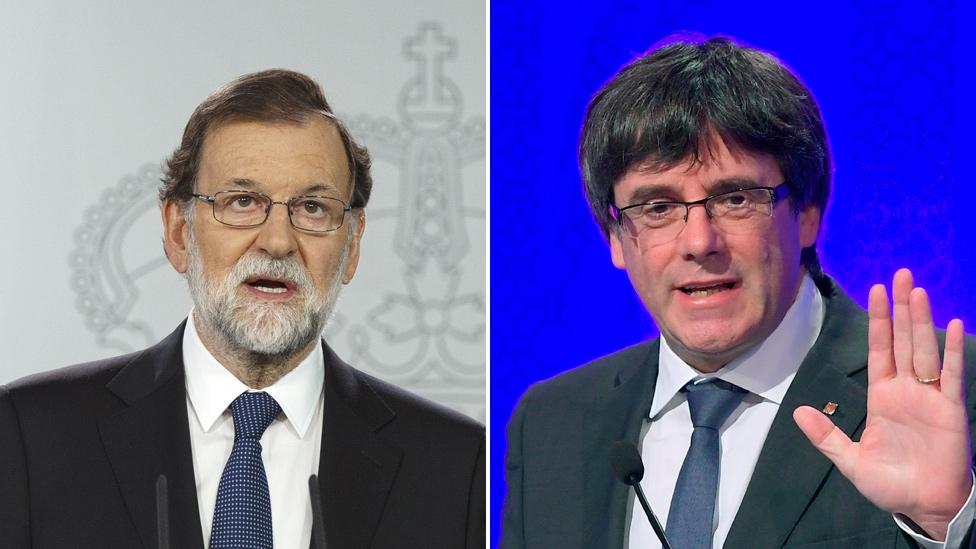Catalan crisis: More populism than separatism?
- Published

Spain is gripped by the duel between Prime Minister Rajoy (L) and Catalan leader Puigdemont
Emotions are running high in Catalonia today. Of course they are.
"The Spanish government is like an abusive husband," one activist raged at me today. "He says he loves you, that he can't live without you. Then, he beats you to stop you from leaving."
Sunday's scenes during the Catalan referendum were awful and played over and over again across social media.
Barca football idol and Catalan-born Gerard Pique wept openly on Spanish television when questioned about the violence.
But it would be wrong to interpret the anger and anguish so palpable in Catalonia right now as an expression of political unity.
Catalans are as divided as ever on the question of independence.
Anti-establishment backlash
What unites them today is a seething fury and resentment at the heavy-handedness of the Spanish government, represented by Prime Minister Mariano Rajoy, with what Catalans perceive as his Madrid-centric arrogance, brutishness and disregard for the rights of individuals.
Spanish police clashed with people trying to get to polling stations to vote
This is far less about separatism than populism. Anti-establishment, nationalist sentiment a la Catalana.
While the majority of Catalans say they don't actually want to leave Spain, they demand the right to choose. Legally and with dignity, in contrast to the chaos and intimidation on show at the weekend.
They are frustrated that their region pays more in taxes to Madrid than it gets back in investment, such as new infrastructure.
They are irritated that pledges of increased autonomy for Catalonia (already one of Europe's most autonomous regions) were then watered down, and still smarting that ordinary people in Catalonia - as across Spain - suffered so much in the 2008 economic crisis, while their tax contributions were used to bail out the banks.
To give you an idea - Catalonia is one of Spain's wealthiest regions. Youth unemployment is far lower here than across the rest of Spain. But it's still a shocking 35%.
Catalans want change, but that does not amount to a common call for independence.
So what now?
Before this weekend, Mariano Rajoy - nicknamed by opponents as "The Robot", as he could never be accused of having the common touch - had all the cards:
the legal argument (Spain's constitutional court deemed this weekend's referendum illegal)
public opinion (most Spaniards opposed the vote)
EU support
and a fractious, disunited front (until this weekend) of Catalan independence parties.
But he's thrown those cards away.
He and the Catalan President, Carles Puigdemont, have walked if not arm-in-arm then at least back-to-back, duel-like, to the cliff's edge.
Diverting attention
A cynic might point out that both men benefit personally from this constitutional crisis - arguably Spain's most severe in the 40 years since the transition to democracy.
Mr Rajoy heads a minority government, so short of support that it recently withdrew plans for the 2018 budget, for fear it wouldn't make it through the Spanish parliament. Meanwhile, Mr Puigdemont presides over one of the largest regional debts in Spain.
Both men are tainted by allegations of corruption, which swirl persistently around their governments.
The Catalan question is a very public distraction from unwelcome financial questions.
Both men score political points from standing their ground now, as opinions in Catalonia and across Spain harden.
As for the EU, some analysts have painted a picture of Eurocrats quaking in their blue and yellow boots. Refusing to condemn Sunday's violence, as they fear the flames of separatism will now spread from Catalonia to Corsica, northern Italy, Flanders and beyond.
But that was the early 2000s, when Basque separatist violence raged too.
Now Basque separatists support Prime Minister Rajoy in the Spanish parliament. Regional separatism is not a 2017 problem for the EU. Populism is.